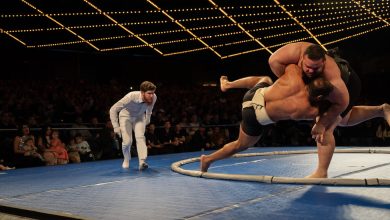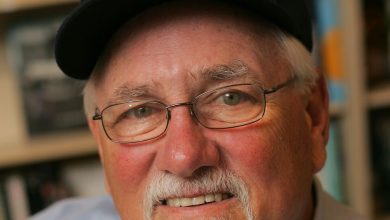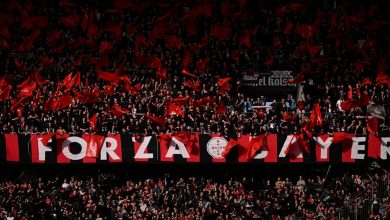‘I Think He’ll Be a Superstar’: A Rookie Learns on the Job

TORONTO — For seven years, Carlos Correa was a centerpiece of the Houston Astros and one of the best players in Major League Baseball.
He was the first overall pick in the 2012 draft. He helped usher in the franchise’s rise to prominence. He was the 2015 American League rookie of the year. He helped guide the Astros to the since tainted 2017 World Series title and to return trips in 2019 and 2021. He became the team’s most vocal leader after the team’s sign-stealing scandal came to light. A two-time All-Star, he was the best fielding shortstop in baseball last season.
Then he left.
The Astros had been preparing for that eventuality, but it finally came in March when Correa, 27, signed a free-agent deal with the Minnesota Twins. The person given the unenviable task of replacing Correa on a win-now team: Jeremy Peña, a 24-year-old drafted in the third round just four years ago. He had only 182 minor league games under his belt.
“Everyone was a little curious because he didn’t have a lot of experience in Triple-A, nor in the big leagues,” Yuli Gurriel, Houston’s longtime first baseman, said in Spanish. “But he’s assumed the responsibility with a lot of maturity. He’s an athlete that does everything, has all the tools. He can run, he has a good arm, he hits for power. In little time, I think he’ll be a superstar.”
A month into his life as a major leaguer, Peña has impressed Astros officials and his teammates not only with his potential and his production — he has been a strong defender and he had five home runs in 22 games entering Tuesday — but also with the way he has carried himself.
“Everyone knows the figure Carlos was for this team,” Gurriel said, adding that Peña has a tough task ahead of him in replacing Correa. “It’s an additional weight for him. Despite all of that, the young man has done it with a lot of maturity.”
The 2022 M.L.B. Season
A season that was in doubt is suddenly in full gear.
- All the Right Moves: Nestor Cortes of the Yankees was struggling to make it in the majors before he leaned in on the oddities that made his repertoire work.
- Is it the baseball?: Mets batters are being hit by pitches at an alarming rate and a star pitcher for the team thinks a change in the baseballs is to blame.
- Musical Chairs: In a series of unexpected off-season moves, franchise icons for the Dodgers and the Braves swapped places — even though neither seemed to want to leave.
- Call Her Manager: Rachel Balkovec is the first woman to manage a team in affiliated baseball. Her players know who is in charge.
Although comparisons between what the Astros had once and have now are inevitable, Peña is playing his own game.
“The team just told me to be myself,” he said before a recent game against the Toronto Blue Jays. “That was the plan from the jump. I never saw it like I’m filling Carlos Correa’s shoes. I’m just going to go out to play my game and get better.”
Peña’s baseball pedigree is unmistakable. In 1997, he was born in Santo Domingo, the capital of the baseball-crazy Dominican Republic. His father, Gerónimo, played in parts of seven seasons with St. Louis and Cleveland, his final season coming in 1996. Although Jeremy never saw his father play, he grew up wanting to know everything about that life.
“Every time when we were eating breakfast or dinner or lunch, we’d always stay at the table for like an extra 45 minutes just talking about him or what he had to go through or my mom as well,” Peña said. “Them just making it out of whatever they had to get through to provide for us.”
When Jeremy was 12, the Peñas moved to Providence, R.I., following an aunt who was already there. Peña didn’t speak any English. He said that it was tough at first but that there was a large Dominican population and he had teachers who also spoke Spanish.
“I learned a lot on the baseball field,” he said. “My teammates were bilingual, and they would teach me the basics, and I would apply that in school. And we’d go back and forth for a year, year and a half, and I was already having full conversations.”
Admittedly skinny and small then, Peña wasn’t a highly touted prospect out of Classical High School when the Atlanta Braves selected him in the 39th round of the 2015 draft. He didn’t sign and instead attended the University of Maine. He said the cold climate and shoveling snow off the field built character while allowing him to grow. (He also ate more and started lifting weights.) Three years later, the Astros took him with the 102nd pick of the draft.
After dealing with shin splints and an underwhelming first season in the minors, Peña went to a private training facility outside Boston that was frequented by some major league players to, in his words, get his body right. Peña is listed now at 6 feet and 202 pounds, displaying the added strength and speed that helped him shoot through the minors. He has tried to model his style of play, he said, after the former Mets shortstop José Reyes.
Having cut his teeth with the Estrellas de Oriente in the ultracompetitive Dominican winter league, Peña spent time around the Astros during spring training in 2019 and 2020 and was on Houston’s taxi squad (a group of reserve players) during the 2021 postseason. That gave him access to a mentor: Carlos Correa.
Peña said Correa had helped him since Day 1, offering advice even though he knew the prospect could supplant him one day.
Peña said his composure came from his father and from watching how his teammates behave. Alex Cintrón, the Astros’ hitting coach and a former big-league infielder, commended Peña’s even keeled nature and inquisitive mind.
“He doesn’t take his bat to the field or his glove to the plate,” third baseman Alex Bregman said. “He’s very good at compartmentalizing and locking in on whether he’s on defense or offense. His ability to turn the page, like if you get out a few times, it’s all right. He goes 0 for 3 and then hits a three-run homer. His ability to do that is amazing.”
Peña’s adjustment to the majors has not been perfect, but it looks better if you give it more than a glance. Defensively, he has made four errors but has been one of the best fielders in baseball so far, according to advanced metrics. At the plate, he is hitting only .215 with a .760 on-base plus slugging percentage, but he has shown top-tier power, with only 25 players in M.L.B. hitting the ball harder this season. (And for what it’s worth, Correa, who signed with the Twins late in spring training, was hitting .256 with one home run and a .651 O.P.S. entering Tuesday’s action.)
Astros Manager Dusty Baker said he did not know yet what Peña’s offensive ceiling might be, but “if you’ve seen the way he busted some balls, he hit some balls, like a big man, to dead center field.”
Baker said Brian Sabean, who was the general manager of the San Francisco Giants when Baker was there and who later built that team into a dynasty, liked to find players with exceptional hand-eye coordination because they could use that skill to grow at the plate.
Baker then rattled off the names of several former and current stars who came up as gifted defenders and developed into better hitters: catcher Yadier Molina and shortstops Ozzie Smith and Dave Concepción.
“He’s way ahead of where Ozzie Smith was,” Baker said of Peña, who later added: “There’s quite a few guys that came up with good hands that learned how to hit. There’s more of them than good hitters that couldn’t field.”




